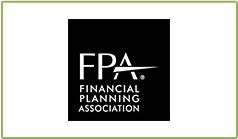FREQUENTLY ASKED QUESTIONS
YOUR QUESTIONS ANSWERED
What should I bring to the first consultation meeting?
What can I expect at the free initial consultation meeting?
Disclosure: FLA does not pay for receiving referrals, or receive compensation for giving them.
What is a CERTIFIED FINANCIAL PLANNER™ practitioner?
As of 2015, all candidates must meet the following standards:
- Education: Possess a four-year college degree, complete approved coursework roughly equivalent to 18 college hours (or already possess specific academic degrees and professional credentials), and complete at least 30 hours of continuing education every two years.
- Examination: Successfully pass a comprehensive 6-hour exam on practical and theoretical concepts of financial planning. (The national pass rate is roughly 63%)
- Experience: Have at least 3 years of professional experience in financial planning or a related field, or two years of apprenticeship experience that meets additional requirements.
- Ethics: Voluntarily ascribe to the CFP® Board’s code of ethics which requires among other things, fiduciary care when providing financial planning.
Are financial planners regulated?
The Securities and Exchange Commission (SEC) and most states have requirements for people who give investment advice, which would include many financial planners. FPA encourages you to ask whether the planner you are considering is a registered investment adviser or is an agent of a company that is registered.
CFP ® practitioners are certified and regulated by Certified Financial Planner Board of Standards, Inc. (CFP Board). By virtue of the certification granted by the CFP Board, CFP ® professionals are held accountable to the CFP Board’s code of ethics for their financial planning activities.
The content for this question provided by Financial Planning Association®, www.FPAforFinancialPlanning.org
How should I start looking for a planner?
You can search for financial planners through various planner search networks. These allow you to search by various characteristics like compensation, areas of expertise, geographic location, or even language spoken:
- National Association of Personal Financial Advisors (NAPFA) – feeonlynetwork.com
- The Financial Planning Association (FPA) – plannersearch.org
- The Certified Financial Planner Board (CFP® Board) – letsmakeaplan.org
How do I choose the right financial planner for me?
Also, many planners specialize in working with certain types of clients, such as small-business owners, executives or retirees. Many have minimum income and asset requirements. Some specialize in certain areas of planning such as retirement, divorce or asset management. This is why we recommend that you interview at least three planners in person to find the right one to serve your needs.
The content for this question provided by Financial Planning Association®, www.FPAforFinancialPlanning.org
You should also ask any potential planner you interview questions about their practice. Both the FPA and CFP® Board have questionnaires for you. We have answered those questions based on our practice.
What information should I request?
Some of the basic information you want to know
• Financial planning and other financial designations the planner holds
• Educational background and work experience
• Licenses to sell certain financial products, such as life insurance or securities
• Services the planner provides
• The planner’s basic approach to financial planning
• Areas of specialization
• Types of clients the planner serves, and any minimum net worth or income requirements
• Professional affiliations, including membership in the Financial Planning Association
• How the planner prepares a plan
• How the planner might address your particular needs
• Whether the planner or others will implement recommendations from the plan
• Business relationships the planner has that might present a conflict of interest
• How the planner is paid for services and the typical charges
A face-to-face interview also should give you a personal sense of the planner. Does the person seem forthright in their answers? Do you have a sense of trust and rapport? Is the person focused on your needs, not selling products?
The content for this question provided by Financial Planning Association®, www.FPAforFinancialPlanning.org
You should also ask any potential planner you interview questions about their practice. Both the FPA and CFP® Board have questionnaires for you. We have answered those questions based on our practice.
How do financial planners charge?
Commission
Denotes the compensation generated from a transaction involving a product or service and received by an agent or broker, usually calculated as a percentage on the amount of his or her sales or purchase transactions. This includes 12(b)1 fees, trailing commissions, surrender charges and contingent deferred sales charges.
Fee Only
A certificant may describe his or her practice as “fee-only” if, and only if, all of the certificant’s compensation from all of his or her client work comes exclusively from the clients in the form of fixed, flat, hourly, percentage or performance-based fees.
Commission and Fee (“Fee-Based”)
If a CFP® professional and any related party receives or is entitled to receive both commissions and fees for providing professional activities, the CFP® professional must disclose his or her compensation as “Commission and Fee.”
The content for this question provided by Financial Planning Association®, http://www.plannersearch.org
How does Financial Life Advisors charge for services?
FLA generally quotes a fixed fee for financial planning engagements. (Hourly quotes are available also.) The price is based upon the expected time to complete the engagement. Our hourly internal billing rates range from $100-$400 per hour. The typical cost for a comprehensive financial plan is $3,000 – $8,000 depending on complexity. Under a fixed fee arrangement, you do not have to pay more if the project takes us more time than we anticipated in our fixed fee.
Wealth Management
Financial Life Advisors charges a fee based upon the total dollar amount of assets being managed. This fee starts at 1.15% of managed assets and decreases based upon total assets being managed. No matter what investments FLA recommends or how often they are traded, our compensation from our clients is the same. Wealth management clients who have completed a comprehensive financial plan also receive ongoing financial planning services, totally covered by the wealth management fee.
Why is Financial Life Advisors Fee-Only?
Physician: “I think you need to have an MRI to rule out X, Y, and Z.”
Patient: “Oh, OK. Do you have a recommendation on where I should go to get one?”
Physician: “Absolutely! Funny you should ask! I have ownership of an MRI clinic here in town. Let me have my assistant schedule you right away!”
Most people find this type of conflict of interest problematic. Is the physician recommending the MRI because of their financial interest in it? Is their clinic the best available, or is the physician biased by their ownership interest in the clinic they own? The physician very likely believes an MRI is necessary and his clinic may be very good, but it is still easy to see why this could make a patient feel uneasy.
FLA feels that way about financial advice. We would rather be paid solely by you to remove potential conflicts of interest and to reassure you that our advice is in your best interests. We believe that all trusted advisors should represent their client’s best interests and not the advisor or those companies they represent.
What is a fiduciary?
“When one person does agree to act for another in a fiduciary relationship, the law forbids the fiduciary from acting in any manner adverse or contrary to the interests of the client, or from acting for his own benefit in relation to the subject matter.”
Financial Life Advisors is ALWAYS a fiduciary when working with our clients. We do so as part of our professional CFP® standards, as well contractually in all of our agreements. From a regulatory perspective, we always serve as a fiduciary because we only operate as a Registered Investment Adviser. Most advisors can also act as a broker and must only meet the much lower Suitability standard.
How often do you meet with clients?
Do you need the services of a financial planner?
The content for this question provided by Financial Planning Association®, www.FPAforFinancialPlanning.org
Is there a minimum asset level to work with Financial Life Advisors?
Wealth management clients generally must have $1,000,000 of investable assets or be willing to pay the equivalent fee for this asset level.
HAVE A QUESTION?
Fill out the form and our expert will be there for your help as soon as possible.
PROFESSIONAL AFFILIATIONS







